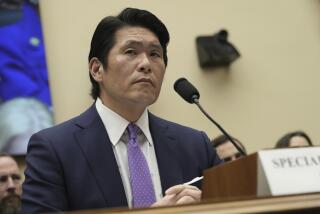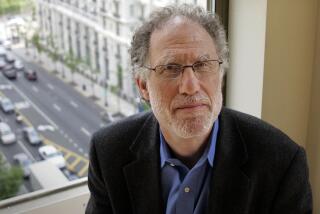NEWS ANALYSIS : Statements on Aide’s Death Bring Trouble for Clinton
- Share via
WASHINGTON — Ten days after deputy White House counsel Vincent Foster apparently committed suicide in a park near Washington, the circumstances of his death--and the handling of questions about it--have turned into a new challenge to the credibility of the Clinton White House.
The questions mounted Thursday after Press Secretary Dee Dee Myers confirmed that White House officials who were going through a briefcase belonging to Foster on Monday found a note, torn into small pieces, that contained a series of thoughts about work that Foster had apparently written to himself. The statements in the note, Myers said, “show him to be in a troubled state of mind.”
White House officials waited a full day before informing government investigators looking into Foster’s death that a note had been found--deciding that they wanted to tell Foster’s widow first.
Officials insisted that the delay did not violate any established procedures, saying that the note did not contain any evidence indicating Foster’s death was anything other than a suicide and that Mrs. Foster had a right to see the document before it was given to police.
But belated disclosure of the delay fit a pattern in which facts about Foster and the events leading to his death have dribbled out, often contradicting earlier statements by White House officials. As a result, Clinton aides once more face a rising tide of unfavorable publicity--this time surrounding a situation that ordinarily would raise nothing but sympathy for the President and his inner circle over the tragic loss of a close friend.
Only a few weeks ago, White House officials thought they had succeeded in repairing their reputation for consistency and candor, which had been tarnished by misstatements and belated clarifications during the White House travel office controversy.
Officials conceded that much of that progress has been reversed.
Part of the explanation, White House officials said, is the unique role Foster played within the President’s inner circle as not only a senior White House lawyer, but also a close friend to First Lady Hillary Rodham Clinton, the President and Chief of Staff Thomas (Mack) McLarty. Because of that, aides said, the Clintons and McLarty have insisted on handling Foster’s death primarily as a private matter--one in which extensive comment by White House officials is “inappropriate.”
“Not everything that happens here can be put into the context of a ‘political’ event,” one senior official declared. He said the press’s inability to treat anything as private amounts to a pathological reaction.
Although that position may spring from only the best of motives, the result has been precisely the opposite of what the White House has said it wants. Officials appear to have taken a tragic event and cloaked it in enough misinformation to make it a subject of mounting fascination in Washington--complete with intimations, to date unsupported by any evidence, of White House malfeasance or cover-up.
“It’s very frustrating,” one senior aide said. “It’s damaging to the President.”
The attitude of senior officials has expressly discouraged other White House officials, including Myers and Communications Director Mark D. Gearan, from asking the senior officials more detailed questions about Foster’s state of mind and his activities, often leaving them unable to answer reporters’ questions effectively.
On Tuesday, for example, Myers told reporters from several news organizations that White House officials had no knowledge of a report that investigators had obtained a handwritten list of three psychiatrists that had been found in Foster’s wallet. The next day, officials confirmed that the reports were true.
On Thursday, White House counsel Bernard Nussbaum admitted in an interview that he had been told of the existence of the list late Tuesday by James Hamilton, the lawyer for the Foster family. But Nussbaum treated the information as a private matter and did not release it to Myers to correct the record. “I still can’t actually confirm it,” he insisted Thursday. “I haven’t seen the list.”
Hamilton declined to comment on any aspect of his representation of the Foster family.
Similarly, for nearly a week, the White House officially stuck by the line Gearan had provided at a press briefing the day after Foster’s death, namely that Foster “never said anything to indicate that anything was out of the ordinary to his colleagues . . . . He never said anything to his colleagues here in the White House or his friends here in Washington that would indicate that anything was out of the ordinary.”
That statement echoed a remark made several hours earlier by the President. Asked if he had “any idea” why Foster might have killed himself, Clinton said that “frankly, none of us do. His closest friends sat around discussing it last night at some length. None of us do.”
In fact, however, as officials belatedly admitted earlier this week, close friends of Foster’s from Arkansas had known for weeks that he was distressed--deeply distressed--over the public criticism that he and other lawyers in the counsel’s office had received, including attacks in editorials in the Wall St. Journal and from Republicans on Capitol Hill.
More to Read
Sign up for Essential California
The most important California stories and recommendations in your inbox every morning.
You may occasionally receive promotional content from the Los Angeles Times.














